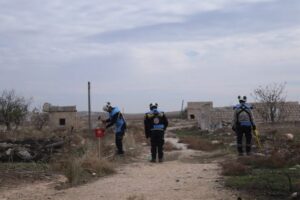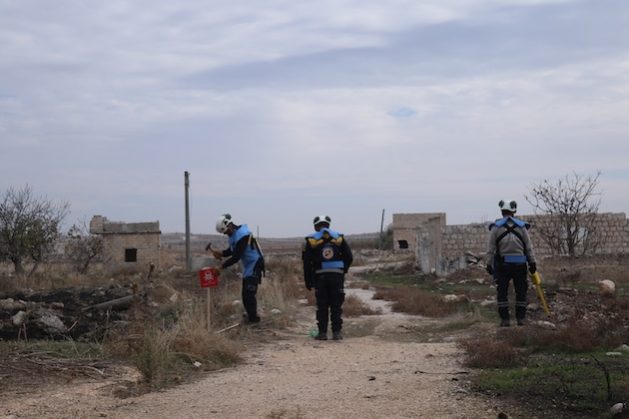
Armed Conflicts, Civil Society, Climate Change, Education, Education Cannot Wait. Future of Education is here, Human Rights, Humanitarian Emergencies

– A global alert is not an option. It requires global action. Over the past three years, the number of crisis-impacted school-aged children in need of urgent quality education support has grown by an alarming 35 million, according to Education Cannot Wait’s new Global Estimates Report.
The recently published report offers a stark and brutal alert for the future of 234 million girls and boys enduring the frontlines of the world’s most dire humanitarian crises. Their access to a quality education is non-existent. We cannot stand by and let the consequences avalanche into a total collapse. They desperately need our urgent collective global action, now.
The complex and horrific disruption of education in Gaza, the Eastern Democratic Republic of the Congo, Sudan, Ukraine and beyond are utterly dangerous and harmful to them and all of us. Without action, we are pushing even more children into harm’s way. Without a quality education, we risk repeating cycles of displacement, instability, insecurity, uncertainty, chaos and mayhem. We risk leaving an entire generation behind. This will have severe impact on their lives, as well as all our lives.
Education Cannot Wait (ECW) and all our partners – be it strategic donors, the private sector, ministries of education, UN agencies, civil society and local communities – have proven again and again that it is indeed possible to make a difference and a bold impact. It is indeed possible to extinguish the fire, reduce the speed of the avalanche and turn challenges into opportunities. In just a few years, we jointly and collectively delivered a continued quality education to over 11 million children and adolescents in the harshest circumstances on earth.
With more funding, we could double that number in just over a year. With even more funding, we can and will eventually become a collective force of nature that makes sure that every child and young person in crises reaches their potential. When they reach their potential through a quality education, they will be the force of nature for their societies and the world at large, be it in science, in business, as highly-qualified teachers, or any other profession that every society needs to thrive and make an impact.
The needs have never been greater. At the same time, the evidenced-based model for success has never been stronger. This is not the time to fear to fail, nor for closing our eyes to the reality, or the power of education to resolve it.
This is an investment in the human potential at its best. It is an investment in stronger economies and greater stability across the globe. No one loses. All are winners.
According to the United Nations, there is a US$100 billion annual financing gap to achieve the education targets in low- and lower-middle income countries. ECW is calling for a tiny part of that figure to make a major impact. That is US$600 million to deliver on the goals outlined in our four-year strategic plan: to reach 20 million crisis-impacted children and adolescents.
The need for collaboration has never been more important. In January, ECW and our close strategic partner the Global Partnership for Education (GPE) issued a Complementarity Note that underscores the value-addition of our individual organizations and charts a path toward increased results, impact, coordination and collaboration. We ensure that there is no duplication, nor double funding. Rather, we provide a holistic approach based on each other’s comparative advantage. The same applies for the third funding mechanism of IFFEd, the International Finance Facility for Education. With the resources required, these three funds work with all our partners to deliver comprehensively and completely. It is possible.
In Sudan, for example, recent analysis from OCHA indicates that of the 4.2 million targeted through the humanitarian response toward education, only 777,000 have been reached thus far, and of the US$131 million humanitarian funding ask for education, only US$22.8 million has been funded thus far. That is an 83% funding gap.
It is astonishing considering that education is both lifesaving and has the power to reduce aid-dependency in the long run. Now, more than ever, we need to step up funding for education in emergencies and protracted crises. Humanitarian, development, public and private sector funding can make a huge contribution to address the vicious cycle of humanitarian crises.
We should make no mistake: the children and adolescents in crises are extremely resilient due to their soul-shattering experiences. Once they get an education, they will certainly tap into extraordinary innovation, unbreakable courage and a limitless source of creativity. Then, they will show us how to make the impossible possible.
In conclusion, we need to connect the dots and see the whole picture. Climate change is no less of a major factor in disrupting education than conflict. Indeed, conflicts, climate change and forced displacement are all interconnected humanitarian crises. In this month’s high-level interview, we discuss the connection between education and climate change with ECW’s Climate Champion Adenike Oladosu. Funding climate change demands funding education, too. We cannot afford to separate the two.
Or, as the multi-faceted Leonardo da Vinci once said: “Learn how to see. Realize that everything connects to everything else.”
The 234 million children and adolescents deprived of a quality education are connected to 8 billion people, our future as a human species and the progress of our world. Making an investment requires us to see the whole picture. It is not an option. It is a call for action.
Yasmine Sherif is Executive Director of Education Cannot Wait
IPS UN Bureau










